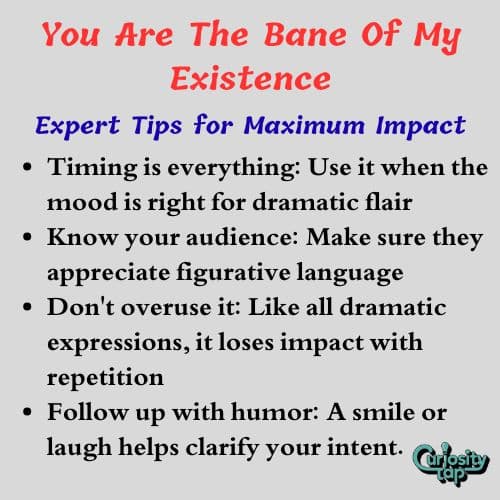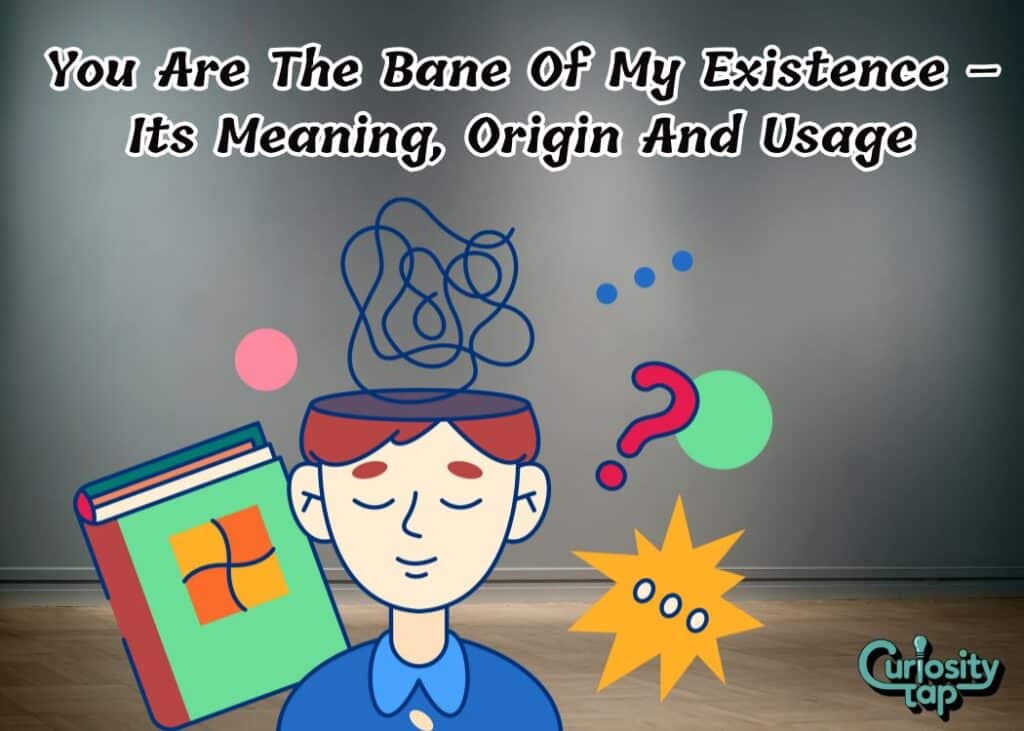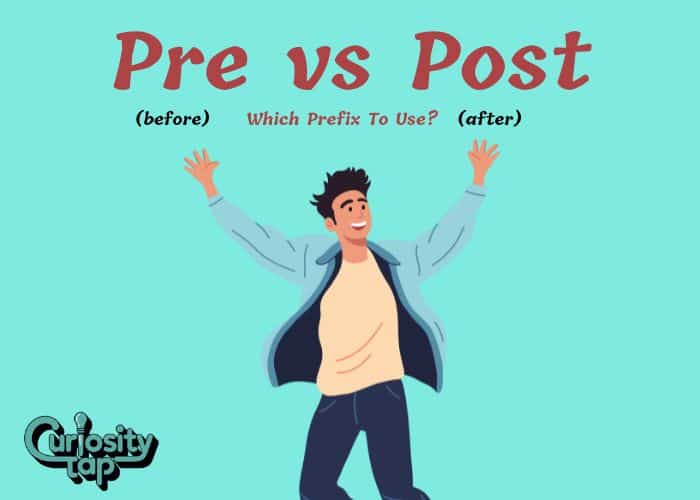Have you ever felt so frustrated with someone or something that you wanted to dramatically declare, “You are the bane of my existence!” Maybe it was your coworker who always microwaves fish in the office kitchen, or perhaps that one friend who’s perpetually late to every single gathering.
We’ve all been there caught between genuine annoyance and the theatrical urge to express our frustration in the most dramatic way possible.
This powerful phrase has been rolling off tongues for centuries, carrying with it a weight of exaggerated emotion and poetic frustration that somehow makes us feel better about our daily irritations.
But where did this expression come from, and why does it feel so satisfying to use? Let’s dive into the fascinating world of figurative speech and discover everything you need to know about this timeless expression.
What Does “You Are the Bane of My Existence” Really Mean?
At its core, “you are the bane of my existence” is a dramatic expression used to describe someone or something that causes persistent trouble, annoyance, or frustration in your life.
It’s a way of saying that this person or thing is the source of your problems your personal nemesis, if you will.
The word “bane” itself comes from Old English and originally meant “poison” or “death.” Over time, it evolved to mean anything that causes harm, ruin, or persistent trouble.
When you call someone the bane of your existence, you’re essentially saying they’re the thing that makes your life difficult or unpleasant.
However, it’s important to understand that this phrase is rarely used with genuine malice. Instead, it’s typically employed as humorous exaggeration or playful drama to express frustration in a more colorful way than simply saying “you annoy me.”
The Historical Journey: From Poison to Playful Insult
The fascinating origin of bane takes us back to ancient times. The word “bane” has roots in Old English “bana,” which meant “slayer” or “murderer.” This connection to death and destruction gives the phrase its dramatic weight even today.
Historical linguistics shows us that “bane” was commonly used in medieval literature and poetry to describe anything that brought about someone’s downfall or destruction. Think of it as the medieval equivalent of calling something your “kryptonite.”
The transition from literal poison to metaphorical language happened gradually over centuries. By the time Shakespeare was writing his plays, “bane” had already begun to shift toward its more figurative meaning.
The phrase “bane of my existence” as we know it today likely emerged in the 18th and 19th centuries, when dramatic language became more common in everyday speech.
Real-World Examples: When Life Gives You Banes
Understanding how “you are the bane of my existence” works in practice helps us appreciate its versatility. Here are some common scenarios where this phrase might naturally arise:
Workplace Frustrations
- Sarah to her colleague who never refills the coffee maker: “Mike, you are the bane of my existence!”
- Project managers about that one team member who always misses deadlines
- Teachers referring to the student who disrupts every class (though hopefully not out loud!)
Family Dynamics and Sibling Rivalry
- Younger siblings who constantly borrow things without asking
- Teenagers about parents who embarrass them in front of friends
- Parents jokingly about their children’s messy rooms
Daily Life Annoyances
- Technology that never works when you need it most
- Traffic jams during your morning commute
- Alarm clocks that wake you up too early
Romantic Relationships and Friendship Teasing
- Partners who leave dishes in the sink
- Friends who always choose the restaurant but never make the reservation
- Roommates who use up all the hot water
Creative Alternatives: Other Ways to Express Your Frustration
Sometimes you want to mix up your emotional expression phrases without losing that dramatic flair.
Here are some equally colorful alternative expressions you can use:
Classic Alternatives
- “You are the thorn in my side”
- “You drive me up the wall”
- “You are my biggest headache”
- “You are the source of all my problems”
More Creative Options
- “You are the storm I can’t outrun”
- “You are the crack in my armor”
- “You are my personal kryptonite”
- “You are the fly in my soup”
Humorous Variations
- “You are the pineapple on my pizza of life”
- “You are the autocorrect of my existence”
- “You are the loading screen of my day”
The Psychology Behind Dramatic Expressions
Why do we find such satisfaction in using exaggerated language like “bane of my existence”? There’s actually some interesting psychology at play here.
Emotional expression through dramatic language serves several purposes:
- Catharsis: It helps us release frustration in a socially acceptable way
- Humor: The exaggeration often makes situations feel less serious
- Connection: Shared dramatic expressions create bonds between people
- Emphasis: It communicates the intensity of our feelings more effectively than bland statements
Using figurative speech also allows us to express negative emotions without being directly confrontational. It’s much more palatable to call someone your “bane” than to simply say “I hate you.”
Modern Usage: How the Phrase Has Evolved
In today’s world, “you are the bane of my existence” has found new life in modern idioms and digital communication. Social media has given this phrase a renaissance, with people using it to describe everything from slow internet connections to their favorite TV characters.
Contemporary usage often includes:
- Memes and social media posts about everyday frustrations
- Romantic drama in movies and TV shows
- Parenting humor in blogs and forums
- Pet ownership jokes (yes, even our beloved pets can be our “banes”)
The phrase has also evolved to be more playful and less serious than its historical counterparts. Today’s usage tends to focus on humorous complaints rather than genuine expressions of hatred.
Practical Tips: When and How to Use This Expression
Understanding the proper context for “you are the bane of my existence” is crucial for effective communication. Here’s some friendly guidance on making the most of this dramatic phrase:
When to Use It
- During light-hearted conversations with friends or family
- When you want to add humor to a complaint
- In creative writing or romantic drama
- When expressing frustration about minor, ongoing issues
When to Avoid It
- In formal or professional settings
- When dealing with serious conflicts
- With people who might not understand the exaggerated nature
- In situations where genuine hurt feelings are involved
Expert Tips for Maximum Impact
- Timing is everything: Use it when the mood is right for dramatic flair
- Know your audience: Make sure they appreciate figurative language
- Don’t overuse it: Like all dramatic expressions, it loses impact with repetition
- Follow up with humor: A smile or laugh helps clarify your intent

Common Situations Where This Phrase Thrives
| Situation | Example | Tone |
| Sibling Arguments | “You ate my leftover pizza again! You’re the bane of my existence!” | Playful/Dramatic |
| Workplace Humor | “The printer is the bane of my existence” | Humorous/Relatable |
| Romantic Teasing | “You’re the bane of my existence… and I love you anyway” | Affectionate/Playful |
| Parenting Moments | “This toy that plays the same song 50 times is the bane of my existence” | Humorous/Exasperated |
| Daily Frustrations | “Monday mornings are the bane of my existence” | Relatable/Dramatic |
Bonus Tip: The Secret to Mastering Dramatic Expressions
Here’s something most people don’t realize about using phrases like “you are the bane of my existence”: the key to making them work is commitment to the performance.
When you use this phrase, don’t just say it embody it. A slight pause before “bane,” a dramatic hand gesture, or even a theatrical sigh can transform a simple complaint into an entertaining moment that brings people together rather than pushing them away.
The most successful users of dramatic language understand that they’re not just expressing frustration they’re entertaining their audience while making their point. This approach turns potential conflicts into shared moments of humor and connection.
FAQs About “You Are the Bane of My Existence”
Is “bane of my existence” considered rude or offensive?
Generally, no. When used in the right context with the right tone, “bane of my existence” is understood as playful exaggeration rather than genuine insult. However, tone in writing and delivery matter significantly in determining how it’s received.
Can I use this phrase in professional settings?
It’s best to avoid dramatic expressions like this in formal workplace communication. Save it for casual conversations with colleagues you know well, or use it when discussing minor frustrations like office equipment or software issues in a humorous way.
What’s the difference between “bane” and other frustration words?
“Bane” carries a more dramatic and poetic weight than simple words like “annoyance” or “problem.” It suggests something that persistently troubles you rather than just a one-time irritation, making it perfect for emotional expression with theatrical flair.
Are there cultural differences in how this phrase is understood?
Yes, English figurative language like this phrase is often better understood in cultures with strong literary traditions. Non-native speakers might take it more literally, so it’s important to explain the humorous intent when using it with international friends or colleagues.
Conclusion
“You are the bane of my existence” proves that sometimes the best way to deal with life’s frustrations is to embrace them with dramatic flair and humor.
This centuries-old expression has survived because it perfectly captures that sweet spot between genuine annoyance and theatrical exaggeration that makes our complaints more entertaining than offensive.
Whether you’re dealing with a perpetually late friend, a malfunctioning printer, or that one coworker who microwaves fish, remember that a little poetic frustration can turn everyday irritations into moments of shared laughter.
So go ahead embrace your inner dramatist and let this timeless phrase add some theatrical spice to your daily conversations!
Call to Action
Want to sharpen your English and write successfully every time?
Check out our Grammar Checker Tool and never second-guess your spelling again!
Read our guide on Common English Misspellings to boost your skills even further.
Read more knowledgeable blogs on Curiosity Tap
Is this article helpful?

Jackson Pearson is a passionate educator and language enthusiast behind the blog Jackson Pearson. With years of experience in teaching and writing, he specializes in simplifying complex grammar rules, breaking down tricky vocabulary, and crafting learning guides that are both engaging and practical. His mission is to help readers boost their English skills whether they’re beginners or brushing up for fluency. Through every article, Jackson brings clarity, structure, and a spark of curiosity to the world of English learning.



